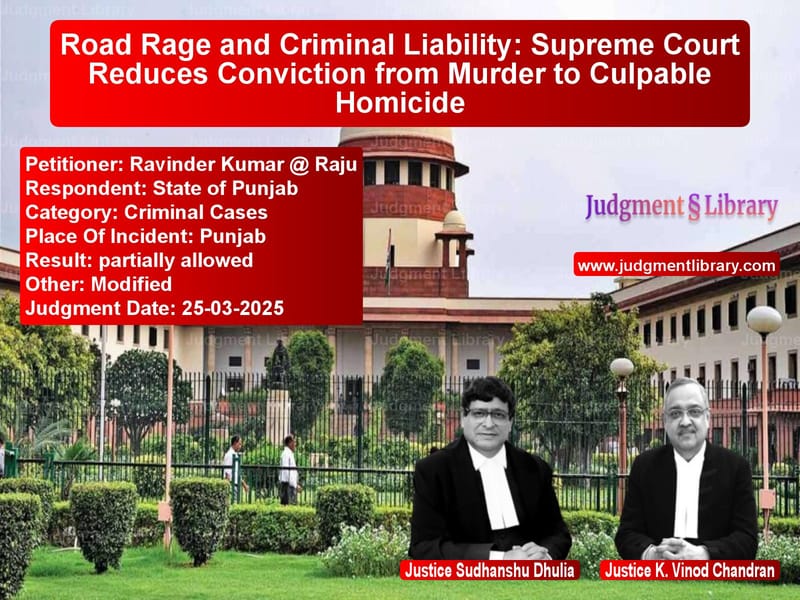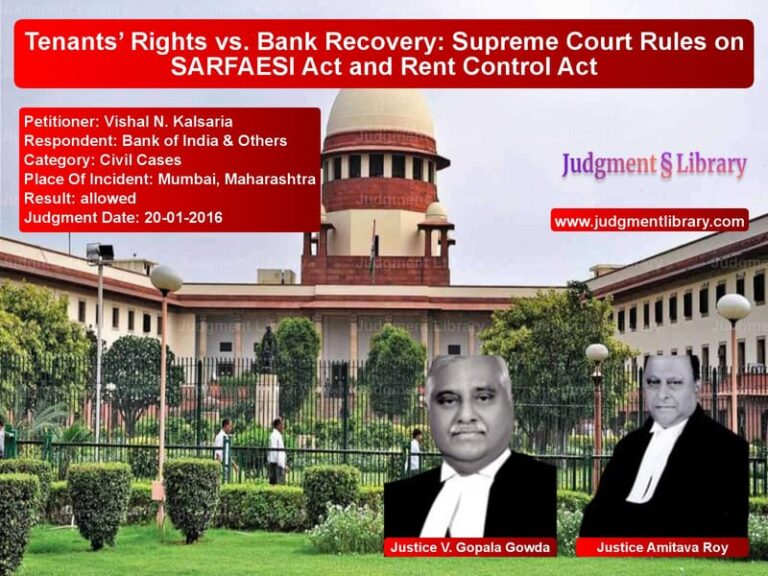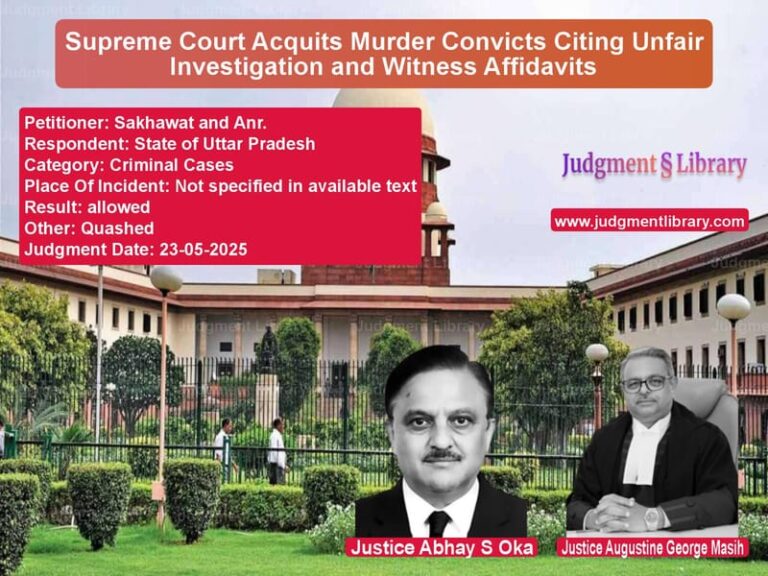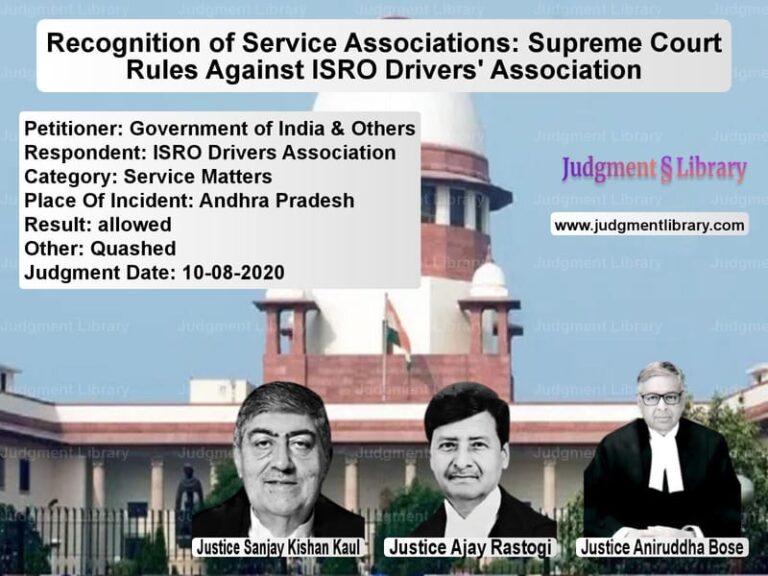Road Rage and Criminal Liability: Supreme Court Reduces Conviction from Murder to Culpable Homicide
On a fateful day, a road rage incident escalated into a violent confrontation, resulting in the death of a young man. What began as an attempt to stop a reckless driver turned into a courtroom battle over intent, culpability, and the legal nuances of murder versus culpable homicide not amounting to murder. The Supreme Court of India, in its recent judgment, re-examined the facts, the actions of the accused, and the legal definitions that differentiate murder from culpable homicide not amounting to murder.
The Incident and the Arrest
On the day of the incident, the deceased was riding a motorcycle with his father as a pillion rider. Alongside them was his brother, also on a separate motorcycle. As they approached an intersection, they witnessed a three-wheeler colliding with a scooter, knocking the rider to the ground. The three-wheeler sped away without stopping. The father and sons stopped to help the fallen scooterist, who, fortunately, was uninjured.
Read also: https://judgmentlibrary.com/supreme-court-quashes-criminal-proceedings-in-jothiragawan-v-state-case/
At that moment, another scooterist, a friend of the fallen rider and a lecturer at a nearby college, arrived. Angered by the reckless driving of the three-wheeler, the group decided to chase the vehicle to hold its occupants accountable. They caught up with the vehicle at another intersection and confronted the three people inside, including the accused, Ravinder Kumar.
The Confrontation and the Fatal Blow
An argument ensued between the two groups. Witnesses stated that the deceased and his family accused the three-wheeler occupants of driving irresponsibly and demanded an explanation. In the middle of the altercation, Ravinder Kumar allegedly picked up an iron rod from his vehicle and struck the deceased on the head. The three-wheeler occupants then fled the scene, leaving the injured man behind.
He was rushed to the hospital but succumbed to his injuries after five days.
Legal Proceedings and Conviction
The prosecution charged Ravinder Kumar and two other occupants of the three-wheeler under Section 302 of the Indian Penal Code (IPC) for murder. The trial court convicted Kumar but acquitted the other two. Kumar was sentenced to life imprisonment and fined ₹2,000.
The High Court upheld this decision, and Kumar subsequently appealed to the Supreme Court, arguing that his actions did not amount to murder but rather culpable homicide not amounting to murder.
Key Arguments by the Petitioner (Ravinder Kumar)
- The accused acted in the heat of the moment, with no premeditation.
- The altercation was started by the deceased and his companions, who aggressively confronted the accused and his friends.
- The accused did not have any intent to kill but acted impulsively during a verbal dispute.
- Since there was only a single blow, it should be considered culpable homicide under Section 304 of the IPC.
The defense counsel argued: “There was no prior enmity between the parties. The accused did not plan the attack. The incident was a spontaneous reaction to a heated argument, and the classification under Section 302 is not justified.”
Arguments by the Respondent (State of Punjab)
- The accused used a heavy iron rod, striking a vital part of the body (head), which showed clear intent to cause grievous injury.
- Even if the act was not premeditated, the accused deliberately inflicted an injury that resulted in death.
- The attack was unprovoked beyond a verbal dispute, and the accused had ample opportunity to de-escalate rather than resorting to violence.
The prosecution stated: “An iron rod to the head is a lethal attack. The accused cannot claim that he was unaware of the potential consequences of his actions.”
Supreme Court’s Analysis and Observations
The Supreme Court reviewed the circumstances and the law governing the distinction between murder (Section 302 IPC) and culpable homicide not amounting to murder (Section 304 IPC). The Court made the following key observations:
- There was no premeditation. The incident arose suddenly during an argument.
- The deceased and his group were the initial aggressors, pursuing and confronting the accused.
- The act was committed in the heat of the moment, without an intention to kill, but with the knowledge that it could cause death.
The Court noted: “There cannot be any intention to cause death alleged, but there is definitely an intention to cause bodily injury which resulted in the death.”
Regarding provocation, the Court stated: “The appellant acted under sudden provocation, thus being deprived of the power of self-control.”
Based on these findings, the Court ruled that the case fell under Exception 1 of Section 300 IPC, which states that culpable homicide does not amount to murder when committed under grave and sudden provocation.
Final Judgment and Sentence Reduction
The Supreme Court modified the conviction from Section 302 (murder) to Section 304 Part I (culpable homicide not amounting to murder). The Court reduced the sentence to seven years of rigorous imprisonment while keeping the fine unchanged.
The Court concluded: “The sentence has to be of 7 years rigorous imprisonment. The fine imposed and the default sentence shall remain untouched.”
The appellant was ordered to surrender within two months if he had not already completed seven years in jail.
Impact of the Judgment
This ruling provides a nuanced understanding of how Indian courts assess culpability in cases of spontaneous violence. The judgment highlights that while sudden provocation does not absolve an accused from liability, it can mitigate the severity of the charge from murder to culpable homicide.
The ruling serves as a crucial precedent in cases where altercations escalate unexpectedly, reinforcing the importance of evaluating intent and provocation in criminal cases.
Petitioner Name: Ravinder Kumar @ Raju.Respondent Name: State of Punjab.Judgment By: Justice Sudhanshu Dhulia, Justice K. Vinod Chandran.Place Of Incident: Punjab.Judgment Date: 25-03-2025.
Don’t miss out on the full details! Download the complete judgment in PDF format below and gain valuable insights instantly!
Download Judgment: ravinder-kumar-@-raj-vs-state-of-punjab-supreme-court-of-india-judgment-dated-25-03-2025.pdf
Directly Download Judgment: Directly download this Judgment
See all petitions in Murder Cases
See all petitions in Attempt to Murder Cases
See all petitions in Bail and Anticipatory Bail
See all petitions in Judgment by Sudhanshu Dhulia
See all petitions in Judgment by K. Vinod Chandran
See all petitions in partially allowed
See all petitions in Modified
See all petitions in supreme court of India judgments March 2025
See all petitions in 2025 judgments
See all posts in Criminal Cases Category
See all allowed petitions in Criminal Cases Category
See all Dismissed petitions in Criminal Cases Category
See all partially allowed petitions in Criminal Cases Category







